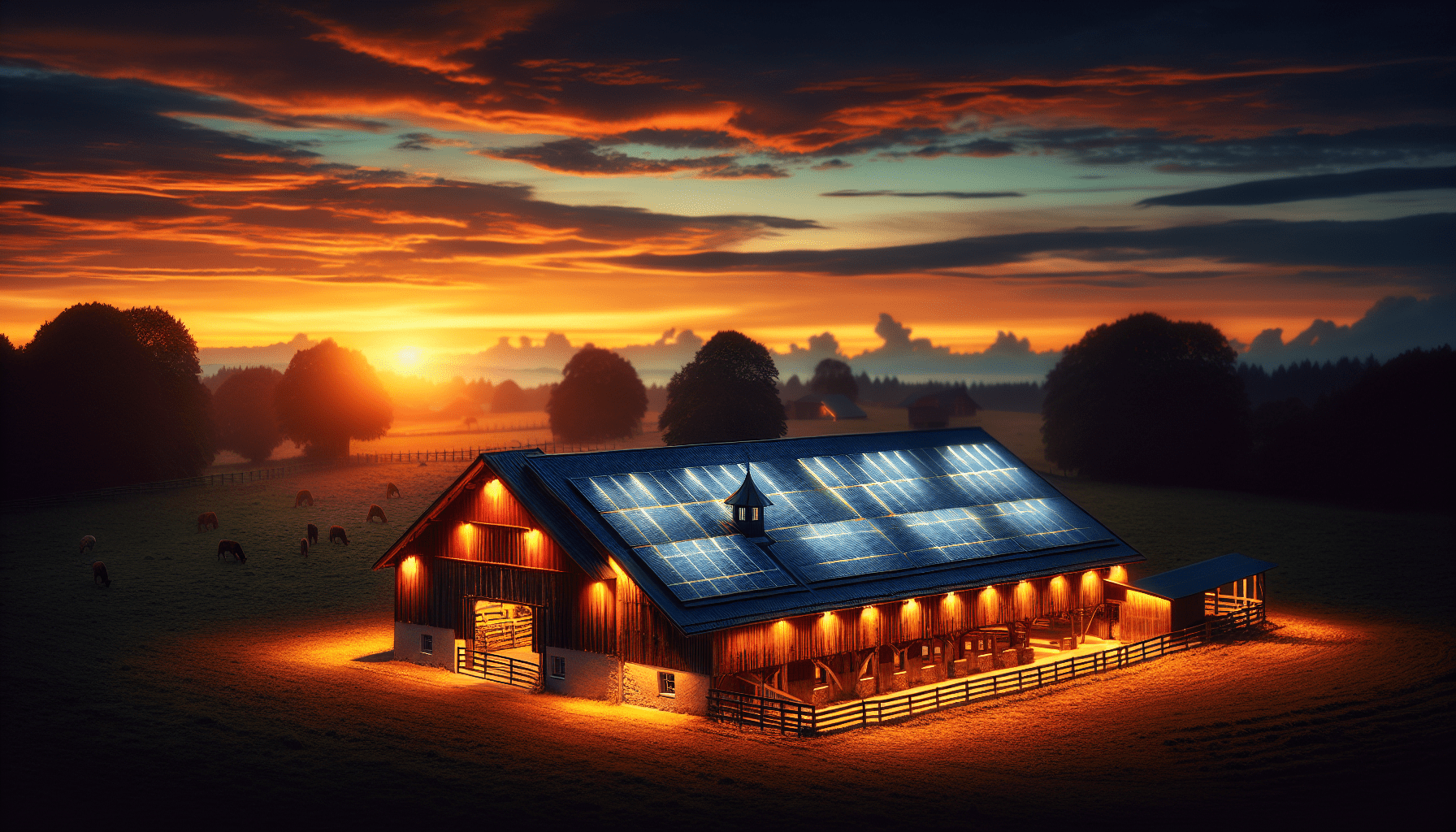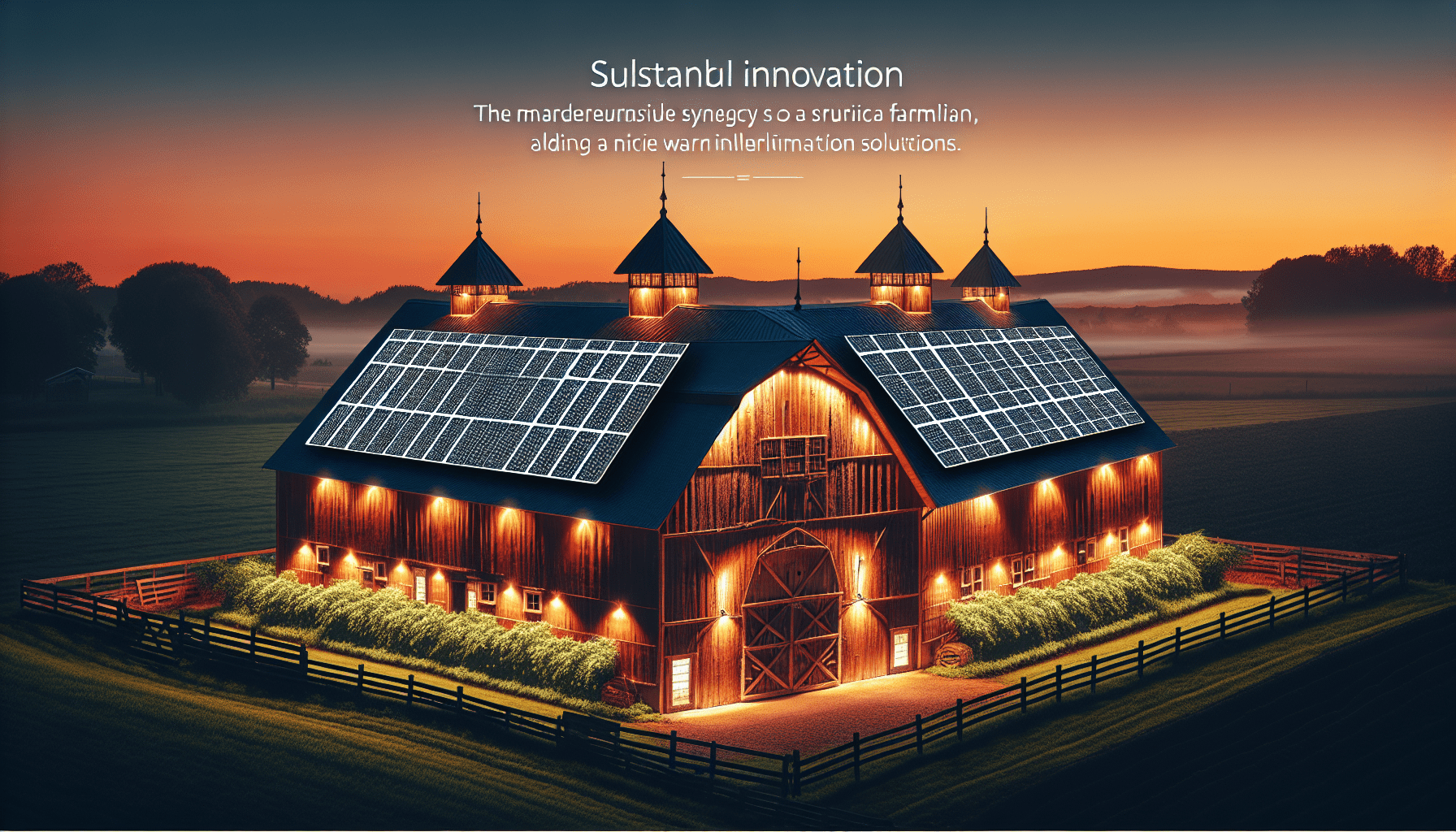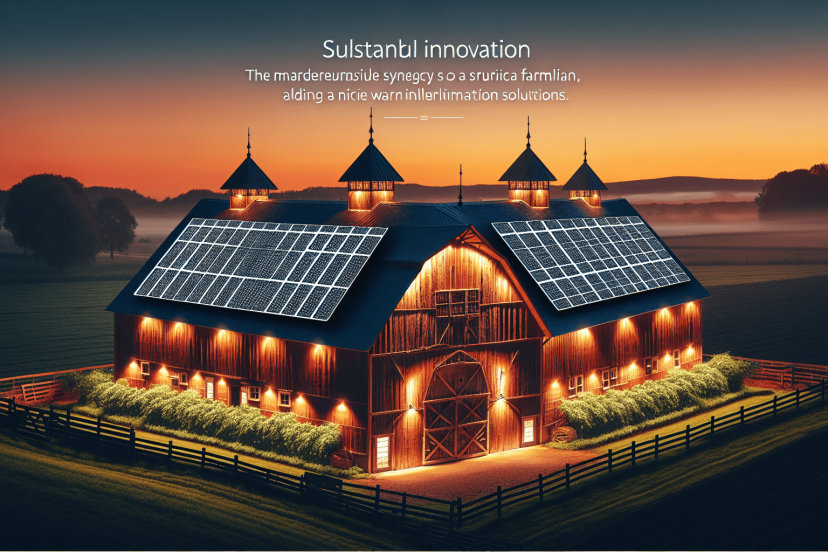Harnessing Solar Power for Barn Lights
As an Amazon Associate, I earn from qualifying purchases, at no additional cost to you. Disclaimer
Have you ever considered the benefits of using solar power for your barn lights? With the growing focus on sustainability and reducing carbon footprints, solar energy is becoming an increasingly popular choice for illuminating spaces of all kinds, including barns. Not only can this renewable energy source light up your barn efficiently, but it can also provide you with cost savings in the long run. Let’s explore the flowing journey of harnessing solar power for barn lights and see how you can integrate this clean energy source into your barn seamlessly.

Click Here to Tap Into Unlimited Solar Power
Understanding Solar Power
Before we get into the specifics of lighting up your barn using solar power, it’s essential to understand what solar power is all about. At its core, solar power is electricity generated from sunlight. The process involves using photovoltaic (PV) cells to convert sunlight directly into electricity. This form of power is clean, sustainable, and abundant, given that the sun is a natural resource available to everyone.
How Solar Panels Work
Solar panels are comprised of many small units called solar cells, often made from silicon, which is a semiconducting material. When sunlight hits the silicon cells, it creates an electric field across the layers, causing electricity to flow. The energy generated can then be used immediately or stored in batteries for later use, such as during nighttime or cloudy days when sunlight isn’t available.
Advantages of Solar Power
There are several compelling reasons to choose solar power over traditional power sources. Firstly, it is environmentally friendly; solar energy reduces reliance on fossil fuels and decreases greenhouse gas emissions. Secondly, solar power systems are low maintenance and can lead to significant cost savings over time. Additionally, technological advancements have made solar panels more accessible and affordable for homeowners and farmers alike.
Why Use Solar Power for Barn Lights?
You might be wondering why you should specifically consider solar power for your barn lighting needs. Barns are unique structures with unique lighting requirements, often located away from traditional power lines. Utilizing solar power for your barn lights can solve various challenges while providing numerous benefits.
Energy Independence
One of the most significant advantages of using solar power for barn lights is energy independence. You’re no longer reliant on the electrical grid and fluctuations in energy prices. This independence can be especially beneficial if your barn is located in a remote area where connecting to the grid might be costly or impractical.
Cost Savings
While the initial investment for solar panels and solar lighting systems might seem high, the long-term savings are worth considering. Once your solar setup is installed, sunlight is free, and maintenance costs are minimal. This can significantly reduce or even eliminate your electricity bills for barn lighting.
Environmental Benefits
By choosing solar power, you contribute positively to the environment. Solar energy is renewable, meaning you’re using a clean energy source that doesn’t deplete Earth’s resources or emit carbon dioxide during generation. This helps combat climate change and promotes a healthier planet.
Click Here to Discover Solar Solutions
Choosing the Right Solar Powered Lights for Your Barn
Identifying the right solar lights for your barn is critical for ensuring efficiency and effectiveness. With a plethora of options available, it’s essential to pick the model that best suits your specific needs and conditions.
Types of Solar Barn Lights
There is a variety of solar-powered lighting options available for barns. Here’s a breakdown of the most common types:
| Type | Description |
|---|---|
| Flood Lights | These provide wide-angle illumination and are perfect for lighting up large areas around the barn. |
| Motion Sensor Lights | Ideal for security, these lights only activate when they detect movement, conserving energy effectively. |
| String Lights | Often used for decoration and ambiance within the barn, providing a warm and inviting atmosphere. |
| Pathway Lights | Used to illuminate walkways leading to and from the barn, ensuring safe passage during night hours. |
Factors to Consider
When choosing solar lights for your barn, consider factors such as the size of the area you need to illuminate, the amount of sunlight your barn receives daily, and your specific lighting requirements. Look for lights with adequate lumens to ensure they meet your brightness needs. Additionally, consider the battery life and the durability of the lighting fixtures, especially if they will be exposed to harsh weather conditions.
Installation of Solar Powered Barn Lights
Once you’ve chosen the right solar lights, the next step is installation. Installing solar-powered lights is a relatively straightforward process, but it still requires careful consideration and planning to ensure optimal performance and longevity.
Preparing the Site
Start by assessing the solar exposure of different areas around your barn. Since solar panels rely on absorbing sunlight, positioning them where they can receive maximum sunlight without obstruction is crucial. Consider any potential shade from trees or other buildings and aim to place panels on south-facing surfaces if possible.
Mounting the Solar Panels
Solar panels can either be mounted on the roof of your barn or ground-mounted nearby. Roof mounting is common as it saves space and generally offers unobstructed access to the sun. Ensure the mounting system you use is secure and can withstand wind and other weather conditions.
Wiring and Connecting
Most solar-powered lights are designed for easy installation, often coming with all necessary components and clear instructions. The lights usually have integrated solar panels or separate panels that connect via cables. If extensive wiring is needed, or if you’re unsure about complex electrical setups, hiring a professional is advisable.

Click Here to Harness Clean Energy Today
Maintenance of Solar Barn Lights
Solar lighting systems are designed to be low maintenance, but they still need some care to function optimally over their lifespan. Here are some tips to keep your solar barn lights shining brightly for years to come.
Regular Cleaning
Dust, dirt, and debris can accumulate on solar panels, reducing their efficiency. Regular cleaning with a soft, damp cloth can effectively remove these and ensure maximum sunlight absorption. Check your lights periodically and clean them at least a couple of times a year, or more frequently if you live in a dusty area.
Battery Checks
Most solar lights come with rechargeable batteries that store excess energy during the day to be used at night. Over time, these batteries can degrade and lose their ability to hold a charge. Check the batteries regularly and replace them as needed to maintain your system’s efficiency.
Inspecting for Damage
Weather elements can impact the structures or materials in your solar lighting system. Inspect your panels, fixtures, and wiring periodically for any signs of wear or damage. Early detection of potential issues can prevent more significant problems later on.
Troubleshooting Common Issues
Even with regular maintenance, you might encounter some common issues with your solar barn lights. Understanding these problems can help you address them swiftly, ensuring your barn remains well-lit.
Lights Not Turning On
If your solar barn lights aren’t turning on, the issue may relate to the batteries. Check if they’re still functional and replace them if necessary. Additionally, ensure the solar panel isn’t covered with debris or blocked from sunlight by new obstructions.
Insufficient Brightness
If your lights are dimmer than usual, the solar panel might not be absorbing enough sunlight. Cleaning the panels or repositioning them to areas with better exposure can solve this problem. Ensure that the system’s batteries are fully charged and operating correctly.
Flickering or Intermittent Lighting
Flickering lights could be due to a loose connection in the wiring. Inspect all cables and connections, securing them as needed. If the lights continue to flicker, check if the batteries are nearing the end of their life.
The Future of Solar Power in Barn Lighting
The potential of solar power in barn lighting is advancing, with new technologies and innovations continuously emerging. Embracing these advancements can further enhance the benefits of solar energy for your barn.
Technological Advancements
Researchers and companies are working on improving solar technologies, including higher efficiency panels, longer-lasting batteries, and more robust and weather-resistant lighting fixtures. Keeping an eye on these innovations can provide you with even more efficient and cost-effective lighting solutions in the future.
Integration with Smart Technology
The evolution of smart technology is also influencing solar lighting systems. Integrating solar barn lights with smart systems can offer increased control over your lighting setups, allowing for remote operation or automated settings based on time of day or ambient light levels.
In a world striving for sustainability, solar power provides an efficient, environmentally-friendly, and cost-effective solution for powering barn lights. Its benefits speak for themselves, making it an attractive option for those looking to harness renewable energy to illuminate their barns. Whether you’re motivated by cost savings, environmental consciousness, or energy independence, solar-powered barn lights offer a viable solution worth considering for your lighting needs.

